Crossway Apologetics Collection (22 vols.)
Digital Logos Edition

Overview
Grow in confidence as you learn how to proclaim the truth in a postmodern society from experts in the field. In this age of skepticism, how do we defend our faith? How do we share the truth with people who don’t believe that truth exists? Christians from all eras of history have faced difficult questions and challenges to their faith. This collection contains primary source texts from pioneering apologists and contemporary works that will equip you with the foundational apologetic tools to strengthen and defend your faith.
Work through the historical and physical evidence supporting claims of Christianity. William Lane Craig and Norman L. Geisler provide helpful volumes surveying the wide field of Christian apologetics, while Nancy Pearcey and Charles B. Thaxton provide a more focused volume covering the relationship between science and faith. Whether you are looking for answers yourself or preparing to discuss your faith publicly, the Crossway Apologetics Collection will reinforce your beliefs and provide you with the tools to clearly and articulately witness to others.
Key Features
- Addresses the most pressing issues in Christian philosophical and practical apologetics
- Features today’s top apologists in their most specialized areas
- Argues for and supports a worldview grounded in the authority of the Bible
Product Details
- Title: Crossway Apologetics Collection
- Publisher: Crossway
- Volumes: 22
- Pages: 7,398
- Christian Group: Evangelicals
- Resource Type: Monographs
- Topic: Apologetics
Individual Titles
- Can You Believe It’s True? Christian Apologetics in a Modern and Postmodern Era by John Feinberg
- Christian Apologetics Past and Present: A Primary Source Reader: Volume 1, To 1500 edited by William Edgar and K. Scott Oliphint
- Christian Apologetics Past and Present: A Primary Source Reader: Volume 2, From 1500 edited by William Edgar and K. Scott Oliphint
- Covenantal Apologetics: Principles and Practice in Defense of Our Faith by K. Scott Oliphint
- The Genesis Factor: Probing Life’s Big Questions by Jon M. Dennis and David R. Helm
- I Don’t Have Enough Faith to Be an Atheist by Norman L. Geisler and Frank Turek
- Reasonable Faith: Christian Truth and Apologetics by William Lane Craig
- Reasons for Faith: Making a Case for the Christian Faith edited by Norman L. Geisler and Chad V. Meister
- Reasons We Believe: 50 Lines of Evidence That Confirm the Christian Faith by Nathan Busenitz
- The Soul of Science by Nancy Pearcey and Charles B. Thaxton
- Atheism Remix: A Christian Confronts the New Atheists by R. Albert Mohler Jr.
- Creation and the Courts: Eighty Years of Conflict in the Classroom and the Courtroom by Norman L. Geisler
- Did Jesus Really Rise from the Dead?: A Surgeon-Scientist Examines the Evidence by Thomas A. Miller, MD
- Hard Questions, Real Answers by William Lane Craig
- The Postmodern World: Discerning the Times and the Spirit of Our Age by Millard J. Erickson
- Roman Catholic Theology and Practice: An Evangelical Assessment by Gregg R. Allison
- Total Truth: Liberating Christianity from Its Cultural Captivity by Nancy Pearcey
- Did Adam and Eve Really Exist?: Who They Were and Why You Should Care by C. John Collins
- Science and Faith: Friends or Foes? by C. John Collins
- Nothing But the Truth: Upholding the Gospel in a Doubting Age by John MacArthur
- Redeeming Science: A God-Centered Approach by Vern S. Poythress
- Modern Art and the Death of a Culture by H.R. Rookmaaker
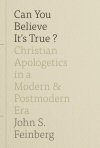
Truth? Can we know it? Today, many people say we can’t. This paradigmatic shift to relativism presents a direct challenge to a Christian’s witness. In this comprehensive treatment, noted scholar John Feinberg argues that truth is both real and knowable, offering a robust guide to Christian apologetics for engagement with our world today.
Many Christians are unprepared to answer the postmodern notion that truth is unknowable and hence ultimately unimportant. That premise refutes itself, of course, but for those already steeped in existential and postmodern ways of thinking, self-defeating propositions are standard fare, and even the simplest truths can seem elusive. Persuading those who love darkness and revel in contradiction can be quite a challenge. Dr. John Feinberg is uniquely qualified to untangle the knots of modern and postmodern thought, pointing us to a better way of understanding truth in the clear light of Scripture. This is an extremely helpful study.
—John MacArthur, pastor, Grace Community Church, Sun Valley, California
John Feinberg meets the challenge of modern skepticism head on, with the full confidence that Christianity is rational and defensible in the marketplace of ideas. Your mind will be stretched and your faith strengthened when you read this book.
—Erwin W. Lutzer, senior pastor, The Moody Church, Chicago, Illinois
John Feinberg’s book is an insightful, thoughtful, and thorough analysis of the modern and postmodern mindsets and a guide on how to engage them. In addition to astute treatments of traditional apologetical themes, such as the Gospels’ reliability and religious pluralism, this volume incisively engages skepticism, truth, and knowledge quite unlike the standard texts in apologetics. Carefully-argued, yet quite readable, Feinberg’s book has much to offer the expert, the novice, and those in between.
—Paul Copan, Pledger Family Chair of Philosophy and Ethics, Palm Beach Atlantic University
John Feinberg is one of the most perceptive Christian thinkers of our time. In Can You Believe It’s True? he affords an accessible and helpful guide for pastors, ministerial students, and laypersons about how to articulate the truth of Christianity effectively in our postmodern era.
—Steve Lemke, provost and professor of philosophy and ethics, New Orleans Baptist Theological Seminary
This volume by John Feinberg presents a more extensive range of subjects than many apologetics textbooks. Beginning with truth and the modern-postmodern debate, Feinberg wades into waters that are explored too seldom in this context but that perhaps include the most gems. Other topics include a detailed investigation of apologetic methodologies, along with specific issues such as the problem of evil, the reliability of the New Testament text, Jesus’s resurrection, and pluralism and tolerance. Each is discussed with understanding and insight. While this is the thorough treatment one would expect from Feinberg, its accessible and relaxed tone gives it a sense of a conversation throughout. I recommend this enjoyable text that can be used at more than one level . . .
—Gary R. Habermas, distinguished research professor, Liberty University and Theological Seminary
John S. Feinberg is professor of biblical and systematic theology and chairman of that department at Trinity Evangelical Divinity School. He is the author of several books, including Ethics for a Brave New World (with Paul D. Feinberg) and The Many Faces of Evil, and is general editor of the Foundations of Evangelical Theology series.
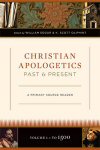
The apostle Peter tells us always to be ready to give a defense to anyone who asks us to account for our hope as Christians (1 Peter 3:15). While the gospel message remains the same, such arguments look different from one age to another. Christian Apologetics Past and Present: A Primary Source Reader: Volume 1, To 1500 is an unprecedented anthology of apologetics texts with selections from the first century AD through the Middle Ages. This first of two volumes, edited by William Edgar and K. Scott Oliphint, features primary source documents from the time of the early church (100-400) and the Middle Ages (400-1500). Featured apologists include Aristides, Justin Martyr, Irenaeus, Tertullian, Origen, Athanasius, Augustine, Anselm, and Thomas Aquinas. The authors also provide a preface to each major historical section, with a timeline and a map, and an introduction to each apologist. Each primary source text is followed by questions for reflection or discussion purposes.
The texts here assembled are ‘classics’—not in the sense that they answer all legitimate questions about Christianity, but that, when they were written, they made their readers think hard about the faith, and that they continue to do so today. This is a most worthy collection.
—Mark A. Noll, Francis A. McAnaney Professor of History, University of Notre Dame
Bill Edgar, one of evangelicalism’s most valued scholars and apologists, has given us in this work with Scott Oliphint a classic destined to be used for generations. I highly recommend it to all who are called to defend the faith.
—Charles Colson, founder, Prison Fellowship and the Colson Center for Christian Worldview
This collection is superbly done and will bring much needed wisdom to our own times.
—David F. Wells, distinguished senior research professor, Gordon-Conwell Theological Seminary
For years I have wanted a book of primary sources in apologetics to use in my classes. Now we have an excellent one in this volume.
—John M. Frame, J.D. Trimble Chair of Systematic Theology and Philosophy, Reformed Theological Seminary, Orlando, Florida
Edgar and Oliphint have skillfully selected the best pre-Reformation sources. Their volume, the first of two, fills a gap in scholarly resources and highlights the strength, wisdom, and solidity of defenders of the faith in earlier times.
—J.I. Packer, board of governors’ professor of theology, Regent College
William Edgar (DTheol, University of Geneva) is professor of apologetics and coordinator of the apologetics department at Westminster Theological Seminary. His books include Reasons of the Heart, The Face of Truth, and Truth in All Its Glory.
K. Scott Oliphint. (PhD, Westminster Theological Seminary) is professor of apologetics and systematic theology at Westminster Theological Seminary in Philadelphia and has written numerous scholarly articles and books, including God With Us. He is also the co-editor of the two-volume Christian Apologetics Past and Present: A Primary Source Reader and Revelation and Reason: New Essays in Reformed Apologetics.
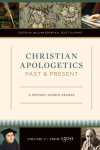
Volume 2 of Christian Apologetics Past and Present takes a sweeping look at apologetics from the Reformation to the present. Readings from 26 apologists, including Martin Luther, John Calvin, Blaise Pascal, Jonathan Edwards, Søren Kierkegaard, Francis Schaeffer, Alvin Plantinga, and William Lane Craig are included. With editorial commentary and questions for reflection, this is a valuable text for both students and people interested in defending their faith.
In an age of historical amnesia such as ours, nothing could be more helpful than to know how the church, in its long march through time, has addressed the opponents of Christian faith. This collection is superbly done and will bring much needed wisdom to our own times.
—David F. Wells, distinguished senior research professor, Gordon-Conwell Theological Seminary
This series on the classical traditions of Christian apologetics is, to my knowledge, unmatched in basic compendia. It will equip and encourage thoughtful Christians to develop equally compelling defenses of the faith in our post-Enlightenment, post-Romantic, post-Postmodern era where global interdependencies plunge many into new varieties of suspicion, contempt, and hostility that demand reasonable and faith-filled encounter, dialogue, and debate.
—Max L. Stackhouse, Rimmer and Ruth de Vries Professor of Theology and Public Life Emeritus, Princeton Theological Seminary
Understanding apologetics as explicating, affirming, and vindicating Christianity in the face of uncertainty and skepticism, Edgar and Oliphint have skillfully selected the best primary sources to introduce us to this ongoing task. Their work fills a gap in scholarly resources and highlights the strength, wisdom, and solidity of the prominent defenders of our faith.
—J.I. Packer, board of governors’ professor of theology, Regent College
William Edgar (DTheol, University of Geneva) is professor of apologetics and coordinator of the apologetics department at Westminster Theological Seminary. His books include Reasons of the Heart, The Face of Truth, and Truth in All Its Glory.
K. Scott Oliphint. (PhD, Westminster Theological Seminary) is professor of apologetics and systematic theology at Westminster Theological Seminary in Philadelphia and has written numerous scholarly articles and books, including God With Us. He is also the co-editor of the two-volume Christian Apologetics Past and Present: A Primary Source Reader and Revelation and Reason: New Essays in Reformed Apologetics.
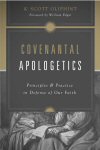
Defending your faith can be daunting, and a well-reasoned and biblically grounded apologetic is essential for the challenge. Following in the footsteps of groundbreaking apologist Cornelius Van Til, K. Scott Oliphint presents an introduction to Reformed apologetics, also referred to as presuppositional apologetics. This book clearly explains the theological foundations of covenantal apologetics and illustrates its application in real-world conversations with unbelievers—helping Christians to boldly and knowledgeably proclaim the gospel.
A major undertaking in Christian apologetics, this volume makes a most timely and welcome contribution. By labeling the apologetic task ‘covenantal,’ Scott Oliphint highlights throughout that the presuppositions of ‘presuppositional apologetics’ are the clear and indubitable teachings of Scripture and not a postmodern understanding of presuppositions. Comprehensive in its scope, this balanced mix of principles and practice provides valuable instruction to a broad range of readers. I commend it most highly, especially to those concerned with responding to the challenges of unbelief, both present and perennial, in growing fidelity to Scripture as God’s Word
—Richard B. Gaffin Jr., professor of biblical and systematic theology, emeritus, Westminster Theological Seminary
In a day marked by shallow thinking, weak reasoning, and arguments lacking in both theological and biblical depth, Oliphint offers an arsenal of apologetic insight. His affirmation and exposition of a covenantal apologetic brings a vital biblical and theological dimension to the apologetic task. Believers seeking to give an answer for the hope that is in us will enthusiastically receive this book.
—R. Albert Mohler Jr., president and Joseph Emerson Brown Professor of Christian theology, The Southern Baptist Theological Seminary
As a teacher I have been crying out for an apologetic primer that would help to demystify a presuppositional method, demonstrate the exegetical and biblical-theological basis for this method, and give some idea as to what this might look like in the real world with real people. Oliphint’s Covenantal Apologetics fills this need. It is not only principled and practical, but pastoral. For those looking to give reasons for hope, I recommend it.
—Daniel Strange, academic vice principal and tutor in apologetics, Oak Hill College, London
Covenantal Apologetics is carefully written, with close attention to detail. It is clear, compelling and cogent. I recommend it to every careful student of this important subject.
—Douglas Wilson, senior fellow of theology, New St. Andrews College
In attempting to put to rest the term ‘presuppositional,’ Oliphint integrates the best insights from his philosophical expertise in the Westminster Seminary tradition with the best insights from the Westminster Assembly theological tradition. The result: a book that aims at both the mind and the heart. As a pastor, I welcome books that offer a consistently Reformed approach to a defense of Christianity, for they are few and far between. This may be the best one yet.
—Mark Jones, senior minister, Faith Vancouver Presbyterian Church
K. Scott Oliphint. (PhD, Westminster Theological Seminary) is professor of apologetics and systematic theology at Westminster Theological Seminary in Philadelphia and has written numerous scholarly articles and books, including God With Us. He is also the co-editor of the two-volume Christian Apologetics Past and Present: A Primary Source Reader and Revelation and Reason: New Essays in Reformed Apologetics.
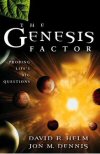
Here is a book for all who have a healthy uncertainty about life’s big questions—Where did I come from? Is there a God? Does this God care about me? The authors believe that the answers are found where Christianity began—with the introduction of God and his work in the book of Genesis. Using the Socratic method, they challenge readers to wrestle with Scripture itself rather than with systematic questions. This candid conversation with Genesis is an ideal apologetic for today’s postmodern culture.
Jon M. Dennis is cofounding pastor of Holy Trinity Church in downtown Chicago. Since moving to the city with his family in 1998, he has helped establish various ministries including Hope for Chicago, the Charles Simeon Trust, and the Chicago Partnership for Church Planting.
David Helm serves on the pastoral staff of Holy Trinity Church, a multi-congregational church in Chicago. In addition he is the executive director of The Charles Simeon Trust, which partners with churches to train men for gospel ministry. In this capacity, he leads workshops on biblical exposition to promote practical instruction in preaching.
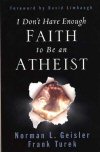
I Don’t Have Enough Faith to Be an Atheist argues that Christianity requires the least faith of all worldviews because it is the most reasonable. The authors lay out the evidence for truth, God, and the Bible in logical order and in a readable, non-technical, engaging style. A valuable aid to those interested in examining the reasonableness of the Christian faith, Geisler and Turek provide a firm challenge to the prior beliefs of doubters and skeptics.
Norman L. Geisler is author or coauthor of some sixty books, including The Baker Encyclopedia of Christian Apologetics, the four-volume Systematic Theology, and many more. He has taught at the university and graduate level for nearly forty years and has spoken or debated in all 50 states and in 25 countries. He holds a PhD in philosophy from Loyola University and now serves as president of Southern Evangelical Seminary.
Frank Turek is a well-known Christian apologist and conference speaker. He holds a DMin in apologetics from Southern Evangelical Seminary.
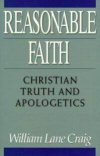
The best choice for a rational and systematic defense of Christianity. This expanded edition covers the existence of God, the problem of miracles, the claims of Christ and other topics.
William Lane Craig (PhD, University of Birmingham, England) is a research professor of philosophy at Talbot School of Theology, Biola University.
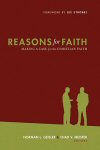
While witnessing for your faith, you often encounter difficult questions and challenges to your beliefs. How should you respond? Editors Norman Geisler and Chad Meister understand the challenges of answering questions about the Christian faith. Their book, Reasons for Faith, gives believers grounded biblical apologetics to help them defend their faith. By both illustrating the importance of apologetics and applying them to popular culture and theological issues, Geisler and Meister provide Christians with the tools they need to share their faith in today’s society.
Reasons for Faith, edited by Norm Geisler and Chad Meister, is a handbook for defending the biblical worldview that every pastor should have on his desk and every thoughtful layperson could study with benefit. This is a timely and timeless book.
—Charles Colson, founder, Prison Fellowship and the Colson Center for Christian Worldview
Norman Geisler and Chad Meister have gathered together many of today’s top apologists in Reasons for Faith, a fresh, new book that serves as an excellent resource for anyone seeking answers regarding matters of faith. Well-documented, yet accessible for the everyday reader, this book sets a new standard for collaborative writing in the area of apologetics. I highly recommend it!
—John Ankerberg, president and founder, The Ankerberg Theological Research Institute
The church today faces a bewildering array of issues that challenge the truth or plausibility of Christian claims. Reasons for Faith provides an informative and helpful response to many of these issues. Even those who may not agree with every argument or conclusion will benefit from careful reading of this significant work.
—Harold A. Netland, professor of philosophy of religion and intercultural studies and the Naomi A. Fausch Chair of Missions, Trinity Evangelical Divinity School
Chad Meister and Norm Geisler have delivered a tour de force for apologetics in Reasons for Faith, a treasure trove of rich apologetical information addressing a myriad of relevant subjects. For saints and seekers alike, this is a must read and an apologetics classic in the making.
—R. Phillip Roberts, president, Midwestern Baptist Theological Seminary
Provides just the formidable, relevant, wide-ranging, and winsome defense of the faith necessary to equip any believer to participate effectively in today’s marketplace of ideas.
—Hank Hanegraaff, president, The Christian Research Institute
Norman L. Geisler is author or coauthor of some sixty books, including The Baker Encyclopedia of Christian Apologetics, the four-volume Systematic Theology, and many more. He has taught at the university and graduate level for nearly forty years and has spoken or debated in all 50 states and in 25 countries. He holds a PhD in philosophy from Loyola University and now serves as president of Southern Evangelical Seminary.
Chad V. Meister is director of philosophy at Bethel College in Indiana. He formerly headed up the Defenders Ministry at Willow Creek Community Church.
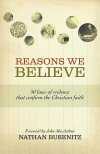
Reasons We Believe will reinforce your personal faith and will provide you with a clear, concise, evangelistic tool to help you share that faith with others. In an age of cynics and skeptics, Christianity is constantly under attack. Believers need resources that defend the veracity of their faith, and Nathan Busenitz provides them. Reasons We Believe confirms and strengthens the faith of believers by demonstrating the reliability of the twofold authority on which Christianity rests: the Word of God and the person of Jesus Christ. This study both reinforces the faith of Christians and provides them with a straightforward evangelistic tool for reaching non-Christians.
A wholesome, faith-affirming volume. It will appeal to Christians who recognize many of the convictions they hold regarding the Christian faith, but who have not seen this many reasons all organized carefully under one cover.
—Gary R. Habermas, distinguished research professor, Liberty University and Theological Seminary
Comprehensive and concise, qualities one rarely finds in the same volume. The book maintains a remarkable focus on Scripture itself. It shows how Christians can make use of traditional evidences and arguments within the Bible’s own framework of thought.
—John M. Frame, J.D. Trimble Chair of Systematic Theology and Philosophy, Reformed Theological Seminary, Orlando
One of the most helpful apologetic guides to appear in a long time. Hugely helpful and highly recommended!
—Ron Rhodes, president, Reasoning from the Scriptures Ministries
We live in a day when authors prostitute their scholarship to become rich on sensationalist books about so-called ‘lost Christianities’ and ‘lost Scriptures.’ Nate Busenitz’s sane and sound treatment of Christian evidences comes as a breath of fresh air.
—William Varner, professor of biblical studies, The Master’s College
Nathan Busenitz serves as an associate pastor and assistant to John MacArthur at Grace Community Church in Sun Valley, California. The author of numerous articles and books, Busenitz also teaches at The Master’s Seminary and is the managing editor of Pulpit magazine.
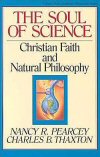
This book surveys the development of science so that Christians may gain an understanding of its historical progression in light of their faith. It looks at science in its formative stages when Christianity was the backdrop to virtually all scientific discussion and then explores the key controversies that over the years have changed the face of science, including past revolutions in math and physics, and the biological revolution that is currently underway.
Nancy Pearcey is a well-known Evangelical writer. She has been the Francis A. Schaeffer Scholar at the World Journalism Institute as well as the Scholar for Worldview Studies of the Center of University Studies at Philadelphia Biblical Institute. In 2012, she became scholar in residence at Houston Baptist University.
Charles B. Thaxton is an intelligent design proponent and author. Thaxton received his doctorate in physical chemistry from Iowa State University and did post-doctoral work at Harvard and Brandies University.
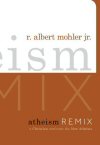
A leading Christian intellectual explores the newest strain of atheism, its foremost thinkers, the cultural conditions that have bred it, and how Christians should respond.
Something has changed in American culture. What for years was a little-regarded belief system—atheism—has now gained a large, and increasing, national hearing through the writings of "new atheists" such as Dawkins, Dennett, Harris, and Hitchens.
Wanting to both inform and equip serious-minded Christians regarding this cultural shift, R. Albert Mohler Jr. explores the environment that has bred the "new atheism" while also introducing readers to the movement’s four leading thinkers and the contours of their arguments. Mohler—deemed "the reigning intellectual of the evangelical movement in the US" by Time magazine—then uses this foundation to pinpoint eight major distinctives that make the new atheism new, and to discuss the future of Christianity in relationship to it.
At school and in the community, Christians are sure to encounter people who have been shaped by this strain of atheism. Here is keen insight that any believer can use to understand and challenge the new atheists.
Thoughtful and insightful, this readable work illuminates for scholars, pastors, and students alike the key issues that must be addressed in order to engage the thinking of Dawkins, Harris, Hitchens, and others. I applaud Albert Mohler for his clarity and conviction in helping us understand that biblical theism is the only true alternative to the New Atheism. I gladly recommend this book!
—David S. Dockery, president, Trinity International University
Instead of becoming just one more voice in the rising debate between Christians and the New Atheists, Dr. Mohler has chosen to provide us with masterful coverage of the dominant writers on both sides. I know of no other introduction to this crucial debate that is as comprehensive and clear in such brief compass. Mohler tells us what’s going on, shows us how much depends on the outcome of this titanic cultural shift, and provides guidance to the resources Christians need to challenge the New Atheism root and branch.
—D.A. Carson, research professor of New Testament, Trinity Evangelical Divinity School; cofounder, The Gospel Coalition
R. Albert Mohler Jr. serves as the ninth president of Southern Seminary and as the Joseph Emerson Brown Professor of Christian Theology. Considered a leader among American evangelicals by Time and Christianity Today magazines, Dr. Mohler hosts a daily radio program for the Salem Radio Network and also writes a popular daily commentary on moral, cultural, and theological issues. He is the author of many books, including The Conviction to Lead: 25 Principles for Leadership That Matters, We Cannot Be Silent: Speaking Truth to a Culture Redefining Sex, Marriage, and the Very Meaning of Right and Wrong, coauthor of and He Is Not Silent: Preaching in a Postmodern World.
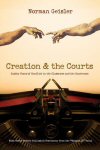
With the explosion of the Intelligent Design movement, many Americans are once again forced to take sides in the long-standing battle between creation and evolution. Yet many feel inadequately educated on the judicial process of this battle.
In Creation and the Courts, Norman Geisler offers a behind-the-scenes look at the testimonies and arguments of the prosecution and defense of the major creation versus evolution court battles. Geisler offers a compelling look at the erosion of Christian influence in America’s public schools. Creation and the Courts encourages readers to learn from the past judicial fights and to take their rightful places in the battle. These conflicts in today’s classrooms and courtrooms must continue to be fought, and anyone willing to be a soldier must be equipped with the knowledge found in this book.
Norman Geisler has always been a ’trail-blazer’ for people who want to speak out about their faith, and Creation and the Courts blazes a trail into the truth of creation vs. evolution. Through his firsthand personal experience in the ’Scopes II’ trial and his exhaustive research into other similar trials, Geisler will draw you into the world of our legal system, better preparing you to address issues of creation and evolution.
—Josh McDowell, author, Evidence for Christianity
As both an eyewitness in the courtroom and a highly respected scholar in the classroom, Norman Geisler provides a unique perspective to one of the most critical discussions of our time. From the Scopes trial to the recent Dover case, Geisler summarizes and counters the often unexamined assumptions left in their wake. This is an invaluable resource on the subject, and I enthusiastically recommend it.
—Ravi Zacharias, founder and president, Ravi Zacharias International Ministries
Norman L. Geisler is author or coauthor of some sixty books, including The Baker Encyclopedia of Christian Apologetics and his four-volume Systematic Theology. He has taught at the university and graduate level for nearly forty years and has spoken or debated in all fifty states and in twenty-five countries. He holds a Ph.D. in philosophy from Loyola University and now serves as president of Southern Evangelical Seminary. He writes on a variety of theological topics and his books include, Systematic Theology (4 vols.), I Don’t Have Enough Faith to Be an Atheist, and The Battle for Resurrection.
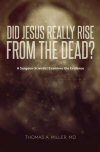
How can a respected scientist believe in the resurrection? Can I trust the Bible’s account that Jesus actually rose from the dead? If the resurrection really occurred, of what importance is it to you and me?
Our ready embrace of the authority of science has left many doubting that Jesus’ resurrection was a verifiable, historical event. Yet Thomas Miller, an experienced scientist and well-respected surgeon, challenges the notion that modern medicine has disproved the possibility of the resurrection.
Through careful investigation of the evidence and evaluation of its reliability, Dr. Miller demonstrates that science and religion are not incompatible and makes a compelling case for the reality of the resurrection.
While many books have been written about the resurrection of Jesus Christ, both pro and con, this work is one of a kind. Most references cite evidence using both medical and scientific expertise. As an accomplished practicing surgeon and research scientist, Miller has approached this book methodically and comprehensively after devoting many years of study. This is an outstanding resource for anyone questioning the authenticity of the resurrection, or for those seeking to better understand the foundation of the Christian faith.
—Jeannie Falwell Savas, associate professor of surgery, Virginia Commonwealth University
Miller has applied his knowledge of anatomy and physiology to bring the unspeakable reality of the crucifixion and death of Christ to our awareness as a prelude to applying the principles of scientific inquiry to a sound defense of the physical resurrection of Christ. The resurrection is pivotal to Miller’s comprehensible, reflective, and personal apologetics of forgiveness, redemption, and restoration. Those seeking truth will be clearly directed to the Way. The wealth of physical and scriptural support for the crucified and resurrected Christ will reaffirm the believer’s convictions.
—Gordon Kauffman, Steven and Sharon Baron Professor of Surgery, professor of physiology, humanities and medicine, The Penn State University College of Medicine
Thomas A. Miller, MD has had a distinguished career in surgery spanning more than 35 years. Previously serving on the surgical faculties of the University of Texas (Houston) and Saint Louis University. Currently, he is professor of surgery at Virginia Commonwealth University in Richmond. In addition to being an active clinical surgeon and educator, he also has been involved in original investigation concerning various aspects of digestive function, much of it funded by the National Institutes of Health for some 26 years. He is the author of more than 200 scientific papers and the editor of three textbooks on surgical physiology.
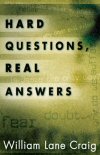
Why doesn’t God answer my prayers? If God is so powerful, why does evil exist? And if He is so good, why do we suffer?
Nonbelievers, and even Christians, are often troubled by questions about suffering, doubt, failure, and unanswered prayer. Yet careful, compassionate answers are hard to find, in part because evangelicals have not taken the life of the mind seriously enough. The intellectual currents of our day are just too strong for simplistic responses.
In Hard Questions, Real Answers, William Lane Craig doesn’t offer trite phrases or pat answers—he offers honest insights gained from a life of study and ministry. Readers in the midst of doubt and confusion will find real answers to these perplexing questions and learn to stand on the only sure foundation for hope—God Himself. This expanded new edition includes chapters on abortion and homosexuality to help readers know how to think about these volatile social issues.
William Lane Craig is research professor of philosophy at Talbot School of Theology in La Mirada, California. He is also the founder of Reasonable Faith (www.reasonablefaith.org), a web-based apologetics ministry. He is the author or coauthor of multiple books, including Reasonable Faith: Christian Truth and Apologetics, Creation out of Nothing: A Biblical, Philosophical, and Scientific Exploration, The Cosmological Argument from Plato to Leibniz, and The Only Wise God: The Compatibility of Divine Foreknowledge and Human Freedom.
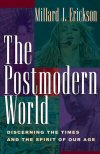
In both subtle and distinct ways, postmodernism has permeated American life, becoming a part of our schools, our TV shows, our churches, our conversations, and even our own thinking. How often have we said or heard, "Do what you want, but don’t push your values on me," or "You live your life, and I’ll live mine"?
Its sheer pervasiveness demands that we ask: Is there anything wrong with postmodernism, or with the tolerance, pluralism, individualism, and casualness that it promotes?
With compelling illustrations from current events and everyday life, as well as his customary sound analysis, Millard Erickson equips discerning evangelical Christians not only to understand and recognize the phenomenon of postmodernism but to deal with its effects in a relevant, biblically minded way. As he unearths its evolution, he forcefully reveals postmodernism’s inherent problems and its incoherence with the teachings of God’s Word. He also unveils the greatest areas of concern for Christians and gives people the tools they need to respond more wisely, believe more certainly, and discern more soundly in this confusing age.
Millard J. Erickson is distinguished professor of theology at Western Seminary in Portland, Oregon. He is a leading evangelical spokesman with numerous highly regarded volumes to his credit, including the classic text Christian Theology, 3rd ed.. His other works include Introducing Christian Doctrine, Third Edition and God in Three Persons: A Contemporary Interpretation of the Trinity.
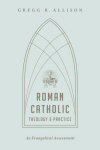
In this balanced volume, Gregg Allison—an evangelical theologian and church historian—helps readers understand the nuances of Roman Catholic teaching. Walking through the official Catechism of the Catholic Church, Allison summarizes and assesses Catholic doctrine from the perspective of both Scripture and evangelical theology.
Noting prominent similarities without glossing over key differences, this book will equip Christians on both sides of the ecclesiastical divide to fruitfully engage in honest dialogue with one another.
If you are looking for a few bullet-points and caricatures, this book will disappoint. But if you are looking for a serious survey drawn from the Catholic Catechism and other primary sources, along with an evangelical assessment of each point, Professor Allison’s labors will pay rich dividends.
—Michael Horton, J. Gresham Machen Professor of Systematic Theology and Apologetics, Westminster Seminary California; author, Calvin on the Christian Life
This book is good news to those who have long desired a reliable theological guide in dealing with Roman Catholicism. Based on a painstaking analysis of the 1992 Catechism of the Catholic Church, it covers the all-embracing trajectory of Roman Catholic theology and practice. Instead of juxtaposing ephemeral impressions and disconnected data, Allison provides a theological framework that accounts for the complexity of the Roman Catholic system and its dynamic unity. This book is to be commended for its biblical depth, theological acuteness, historical alertness, and systemic awareness. My hope is that this landmark book will reorient evangelical theology away from its attraction for a shallow ecumenicity with Rome toward a serious dialogue based on the Word of God.
—Leonardo De Chirico, lecturer of historical theology, Istituto di Formazione Evangelica e Documentazione, Padova (Italy)
Gregg R. Allison is professor of Christian theology at The Southern Baptist Theological Seminary. He is secretary of the Evangelical Theological Society, a book review editor for the Journal of the Evangelical Theological Society, an elder at Sojourn Community Church, and a theological strategist for Sojourn Network. Allison has taught at several colleges and seminaries, including Western Seminary in Portland, Oregon, and Trinity Evangelical Divinity School in Deerfield, Illinois, and is the author of numerous books, including Historical Theology: An Introduction to Christian Doctrine.
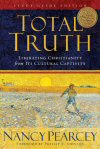
Does God belong in the public arena of politics, business, law, and education? Or is religion a private matter only—personally comforting but publicly irrelevant?
In today’s cultural etiquette, it is not considered polite to mix public and private, or sacred and secular. This division is the single most potent force keeping Christianity contained in the private sphere—stripping it of its power to challenge and redeem the whole of culture.
In Total Truth, Nancy Pearcey offers a razor-sharp analysis of the public/private split, explaining how it hamstrings our efforts at both personal and cultural renewal. Ultimately, it reflects a division in the concept of truth itself, which functions as a gatekeeper, ruling Christian principles out of bounds in the public arena.
How can we unify our fragmented lives and recover spiritual power? With examples from the lives of real people, past and present, Pearcey teaches readers how to liberate Christianity from its cultural captivity. She walks readers through practical, hands-on steps for crafting a full-orbed Christian worldview.
Finally, she makes a passionate case that Christianity is not just religious truth but truth about total reality. It is total truth.
This new study guide edition is filled with fresh stories, examples, and illustrations. Based on questions and comments raised by readers of the book, it is ideal for individual or group study.
This book continues the Schaeffer-inspired project that Nancy Pearcey and Chuck Colson began in How Now Shall We Live?-awakening evangelical Christians to the need for a Christian ’worldview,’ which Pearcey defines as ’a biblically informed perspective on all reality.’ This is the rare long book that leaves one wanting to read more.
—Publisher’s Weekly
Pearcey is an outstanding writer with the ability not only to express deep thoughts in a very readable way, but one who also understands a biblically reformed world and life view. If you buy only one book this year, this would be at the top of the list.
—Equip For Ministry
Nancy Pearcey is scholar for worldview studies at Philadelphia Biblical University’s Center for University Studies. Pearcey has authored or contributed to several works, including the ECPA Gold Medallion winner How Now Shall We Live? (with Charles Colson) and The Soul of Science (with Charles Thaxton).
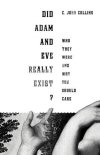
Throughout history, most Christians have believed that Adam and Eve were actual persons, of whom we are all descendants. Some Christians today, however, readily dismiss the historical consensus, arguing that those same Christians also believed the earth was the center of the universe. Understandably, there are reasons to doubt the traditional view . . . and yet rarely are those doubts humbly subjected to serious scholarship.
C. John Collins invites both doubts and scholarship to the table. Applying well-informed, critical thinking to questions raised by theologians and scientists alike, Collins examines the historicity and relevance of a real Adam and Eve, ultimately answering the questions: Did Adam and Eve really exist? And why should we care?
Dr. Collins has presented a careful defense of the existence of the historical Adam and Eve. This methodologically rigorous study reflects a critical awareness of contemporary discussions on both biblical and extra-biblical literature and further contributes to the wider discussion on science and religion. Perhaps more importantly, he has successfully demonstrated the theological significance of this traditional reading, all the while using language that an informed layperson can digest and engage. This work deserves to be widely circulated.
—David W. Pao, chair of the New Testament Department, Trinity Evangelical Divinity School
Working through questions of myth and history, Bible and science, harmonization and complementarity, Collins brings fresh arguments to stimulate wide-ranging thought and improved appreciation of the way the first chapters of the Bible affect the whole.
—Alan Millard, Emeritus Rankin Professor of Hebrew and Ancient Semitic Languages, The University of Liverpool
C. John Collins is professor of Old Testament at Covenant Theological Seminary in St. Louis, Missouri. With degrees from MIT and Faith Evangelical Lutheran Seminary, he pursues such research interests as Hebrew and Greek grammar, science and faith, and biblical theology. He is the author of Genesis 1-4: A Linguistic, Literary, and Theological Commentary and The God of Miracles: An Exegetical Examination of God’s Action in the World.
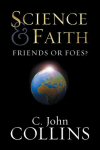
Many believers worry that science undermines the Christian faith. Instead of fearing scientific discovery, Collins believes that Christians should delight in the natural world and study it. God’s truth will stand against any challenge and will enrich the very scientific studies that we fear.
C. John Collins first defines faith and science, shows their relation, and explains what claims each has concerning truth. Then he applies the biblical teaching on creation to the topics of "conflict" between faith and science, including the age of the earth, evolution, and miracles. He considers what it means to live in a created world. This book is for anyone looking for a Christian engagement with science without technical jargon.
Collins maps the entire interface between faithful biblical interpretation and questions of all sorts posed in the name of the sciences. Interesting, fair-minded, shrewd, and clear from start to finish, this will prove outstanding as a pastoral resource.
—J.I. Packer, Board of Governors’ Professor of Theology, Regent College
There is something here for just about everyone. Science and Faith is required reading for all who are interested in the relationship between science and the Christian faith."
—J.P. Moreland, distinguished professor of philosophy, Biola University
C. John Collins is professor of Old Testament at Covenant Theological Seminary in St. Louis, Missouri. With degrees from MIT and Faith Evangelical Lutheran Seminary, he pursues such research interests as Hebrew and Greek grammar, science and faith, and biblical theology. He is the author of Genesis 1-4: A Linguistic, Literary, and Theological Commentary and The God of Miracles: An Exegetical Examination of God’s Action in the World.
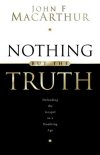
Scripture is clear about the fact that we must be prepared to communicate the truth of the Gospel when given the opportunity—and do it with the right attitude. But even when your tone is gentle and respectful, what, specifically, should you say when asked or confronted about your faith? And what is your overall responsibility to unbelievers as a disciple of Christ?
Pastor John MacArthur responds to these very questions and more—with solid, biblical answers focused in four particular areas:
- your attitude
- your preparedness
- the content of your answers
- your priority in witnessing
Combining a biblical study of evangelism, a rational defense of Christian beliefs, and a practical approach to evangelism, this book offers a well-rounded perspective that can help you gently and confidently give an answer for the hope you have in Christ.
John MacArthur has served as the pastor of Grace Community Church in Sun Valley, California, since 1969. He is known for his verse-by-verse expository preaching, and his pulpit ministry has extended around the world via his daily radio program, Grace to You. He has also written or edited nearly four hundred books and study guides, including Twelve Extraordinary Women, Twelve Ordinary Men, and The Gospel According to the Apostles. Many of his numerous sermons are available in the John MacArthur Sermon Archive (3,127 sermons). MacArthur serves as the president of The Master’s College and Seminary, a four-year liberal arts Christian college.
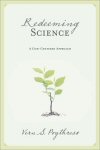
Many people think science is antagonistic to Christian belief. Science, it is said, shows that the universe is billions of years old, while the Bible says it is only thousands of years old. And some claim that science shows supernatural miracles are impossible. These and other points of contention cause some Christians to view science as a threat to their beliefs.
Redeeming Science attempts to kindle our appreciation for science as it ought to be—science that could serve as a path for praising God and serving fellow human beings. Through examining the wonderfully complex and immutable laws of nature, author Vern Poythress explains, we ought to recognize the wisdom, care, and beauty of God. A Christian worldview restores a true response to science, where we praise the God who created nature and cares for it.
Poythress shows how a proper understanding of biblical theology makes possible not just one but many credible harmonizations of biblical and scientific truth. Along the way, he provides an insightful defense of the theory of intelligent design as a viable scientific research program. His examination of the mathematical beauty inherent in the universe gives yet another compelling reason to acknowledge the wisdom and design that lie behind physical reality.
—Stephen C. Meyer, director, Center for Science and Culture, Discovery Institute
With doctorates in both New Testament and mathematics, and with a solid commitment to orthodox Reformed theology, Vern Poythress is uniquely qualified to write on the theology of science. This is by far the most important book you can read on this subject. I recommend it without reservation.
—John M. Frame, J.D. Trimble Chair of Systematic Theology and Philosophy, Reformed Theological Seminary, Orlando
Vern S. Poythress is professor of New Testament interpretation at Westminster Theological Seminary, where he has taught for nearly four decades. In addition, he has earned six academic degrees, including a PhD from Harvard University and a ThD from the University of Stellenbosch. He is the author of numerous books and articles on a variety of topics, Redeeming Mathematics: A God-Centered Approach, The Returning King: A Guide to the Book of Revelation, and Logic: A God-Centered Approach to the Foundation of Western Thought.
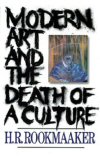
This disturbing but illuminating classic is a brilliant perspective on the cultural turmoil of the radical sixties and its impact on today’s world, especially as reflected in the art of the time. Rookmaaker’s enduring analysis looks at modern art in a broad historical, social, and philosophical context, laying bare the despair and nihilism that pervade our era. He also shows the role Christian artists can play in proclaiming truth through their work.
Rookmaaker’s brilliant articulation of faith and scholarship is insightful and inspiring. The book moves freely and with a sense of urgency between the worlds of high culture, popular art and music, and Christian faith. This timely edition makes his foundational work available to a new generation. Gain a perspective on art that more closely reflects God’s purpose. Trace the trend of art during the twentieth century with Rookmaaker as a trusted guide.
H. R. Rookmaaker (1922–1977) grew up in the Dutch East Indies. As a young man in wartime Holland, he was interned for distributing anti-Nazi leaflets and became a Christian during that time. In 1948 a lifelong friendship with Francis Schaeffer began. In 1959 Rookmaaker published his doctoral thesis on the artist Gauguin, and in 1965 he was invited to the chair of Art History at the Free University of Amsterdam. Rookmaaker was also highly respected as a jazz critic.